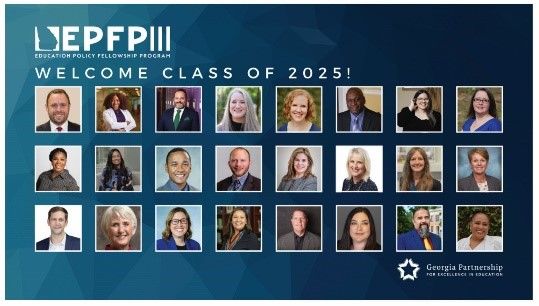Georgia Bio’s Megan Heaphy Named to the 2024-2025 Education Policy Fellow Program

Atlanta, GA (August 5, 2024) – The Georgia Partnership for Excellence in Education is thrilled to announce the selection of 24 new fellows for the 17th cohort of the Education Policy Fellowship Program (EPFP), including Megan Heaphy, Director of Georgia Bio’s Biotech Teacher Training Initiative & Manager of Workforce & Talent.
This cohort of leaders are embarking on an intensive 10-month journey through Georgia's education policy landscape that will begin in August 2024 and conclude in May 2025.
The participants will hear and discuss education policy with the most respected policy makers in the state and nation. At the end of a year, EPFP Fellows will be better informed, more skillful advocates for sound public policy.
“Georgia Bio congratulates Megan and her acceptance into this prestigious program,” said Maria Thacker-Goethe, President and CEO of Georgia Bio. “This experience will not only provide Megan with valuable leadership training skills, but also the organization more knowledge and networks to advance the core issues of education policy that align with our efforts to strengthening Georgia's bioscience workforce.”
Heaphy has been with Georgia Bio for over 6 years and oversees workforce development efforts spanning the entire workforce pipeline, from K-12 to the current workforce. She has over a decade of experience in science education, having taught Chemistry, Biology and AP Biology in metro Atlanta high schools in Clayton and Gwinnett counties, as well as life sciences courses at Gwinnett Technical College and Georgia State University. Heaphy serves in various leadership roles including with Atlanta Technical College, Central Georgia Technical College, Athens Technical College bioscience program advisory boards, and the Athens Community Career Academy Biomanufacturing Catalyst Committee.
A Georgia native, with degrees from Georgia Institute of Technology and Georgia State University, Heaphy has a passion for helping educators and students gain awareness of pathways to employment within life sciences and ensuring that schools have the materials to do hands-on science labs through the Georgia Bio Equipment Depot.
MEDIA CONTACT:
Melissa Carter
404-920-2043
mcarter@gabio.org
EIN Press Release: https://www.einnews.com/pr_news/733499127/georgia-bio-s-megan-heaphy-named-to-the-2024-2025-education-policy-fellow-program





